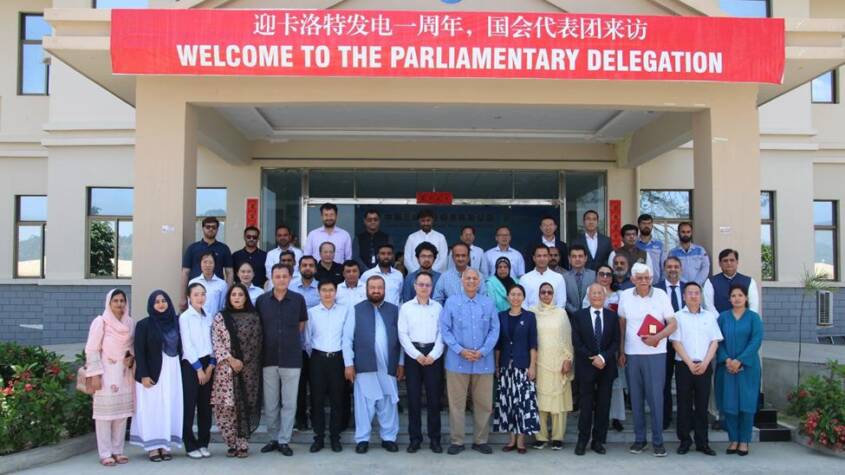(Islamabad: June 20, 2023) A Parliamentary Delegation visited the Karot Hydropower Project to commemorate its 1st Anniversary and celebrate the 10 years of the China-Pakistan Economic Corridor (CPEC) and the 10 Years of BRI. The Delegation was led by Senator Mushahid Hussain Sayed, Chairman Pakistan-China Institute. Mustafa Hyder Sayed, Executive Director Pakistan-China Institute, also accompanied the delegation.
This was the first of its kind Cross Party Parliamentary delegation to have visited the Karot Hydropower Project which included Senator Waleed Iqbal, Senator Taj Haider, Senator Sadia Abbasi, Senator Palwasha Mohammad Zai Khan, Senator Rukhsana Zuberi, Mohammed Ķĥâń Daha, MNA, Senator Pir Sabir Shah, and Senator Muhammad Asad Ali Khan Junejo. Moreover, journalists, bloggers, and students were also a part of this delegation. `
The Parliamentary delegation expressed admiration for the commitment of the Karot Hydropower Project to clean energy generation and its contribution to Pakistan’s development agenda. They also acknowledged the project’s pivotal role in meeting the country’s energy-increasing demands while addressing environmental concerns.
The delegation was warmly welcomed by Mr. Wang Minsheng, CEO of CSAIL, who delivered an introductory speech emphasizing the significance of the Karot Project and the operations underway to boost Pakistan’s energy sector. He said that the Karot Hydropower Project is the flagship project of CPEC, featuring sincere cooperation and mutual benefit between China and Pakistan. Expanding on the project benefits he said, “With an annual generating capacity of about 3.2 billion kWh, the project is expected to save about 1.4 million tons of standard coal and reduce carbon dioxide emissions by 3.5 million tons each year, meeting the electricity needs of 5 million people in Pakistan.”
In an interview given to CCTV, Xinhua and Phoenix TV, the Head of the Parliamentary Delegation, Senator Mushahid Hussain Sayed appreciated the project team for the effective operation and maintenance of the Karot Hydropower Project. Additionally, he emphasized the importance of CPEC as the backbone of Pakistan’s economic growth – voicing optimism regarding the CPEC and regional connectivity to ensure course correction to lessen Pakistan’s dependency on IMF.
Senator Mushahid Hussain Sayed also appreciated the CSR initiatives taken by the 3 Gorges company, in which the company supported a 60-bed THQ Hospital Kahuta, which serves 30,000 patients per month. In addition to the various schools, access roads, and other infrastructure supported by the Karat Project for its local communities. Senator Mushahid said through CPEC and regional economic and energy connectivity with Iran, Russia, Central Asian Republics and Gulf states like Saudi Arabia, UAE and Qatar, Pakistan can bid goodbye to the IMF.
Mustafa Hyder Sayed, while welcoming the visit of the parliamentary delegation, termed it a consensus-building exercise and called for more such visits to other CPEC sites as well. In his view, these visits serve as providing first-hand information about facts and achievements on the ground, helping to refute the propaganda against CPEC in Pakistan. He said Karot has a 3-fold significance: Karot is a CPEC success story as it was completed a year ahead of schedule at less than the stipulated time, then Karot is about Clean Energy & Green Development, and finally, Karot has helped local communities to change their lives for the better through schools, hospitals, roads and infrastructure like bridges.
Senator Waleed Iqbal, another delegation member, stated that the Karot Hydropower Project is the first large-scale hydropower project under the Belt and Road Initiative, emphasizing that its significance is not only for Pakistan but also for the regional development of Green Energy.
Counsellor Bao Zhong from the Chinese embassy said that with the joint efforts of people from all walks of life in the two countries, the Karot Hydropower Project has made remarkable achievements, which strongly resonate with the spirit of the “Belt and Road” initiative joint consultation, joint construction and shared benefits. She said, “China is willing to work with Pakistan to earnestly implement the consensus reached by the leaders of the two countries and jointly promote the high-quality development of the Belt and Road”.
The delegation had the opportunity to examine key project components such as the spillway, dam structure, and powerhouse during their visit. China Three Gorges Corporation (CTGO) professionals presented technical briefings on project elements and environmental protection measures implemented in the project region. The delegation experienced the Karot HPP’s cutting-edge technology and infrastructure for generating clean electricity from water resources.
A group picture was taken to commemorate the occasion, capturing the shared enthusiasm between the parliamentary delegation and the project team. Commemorative shields marking the one-year anniversary of the Karot HPP were presented to the delegation members as souvenirs, symbolizing the fruitful collaboration between the government and project stakeholders.
The Karot Project, with a capacity of 720 MW, has been developed and sponsored by the China Three Gorges South Asian Investment Limited (CSAIL), the investment arm of China Three Gorges Corporation managing investments in Pakistan. The Karot Hydropower Project is committed to maintaining the greatest levels of efficiency, sustainability, and community involvement. The visit by the Parliamentary delegation would further cement the project’s position as a pioneering endeavor in Pakistan’s clean energy sector.
















